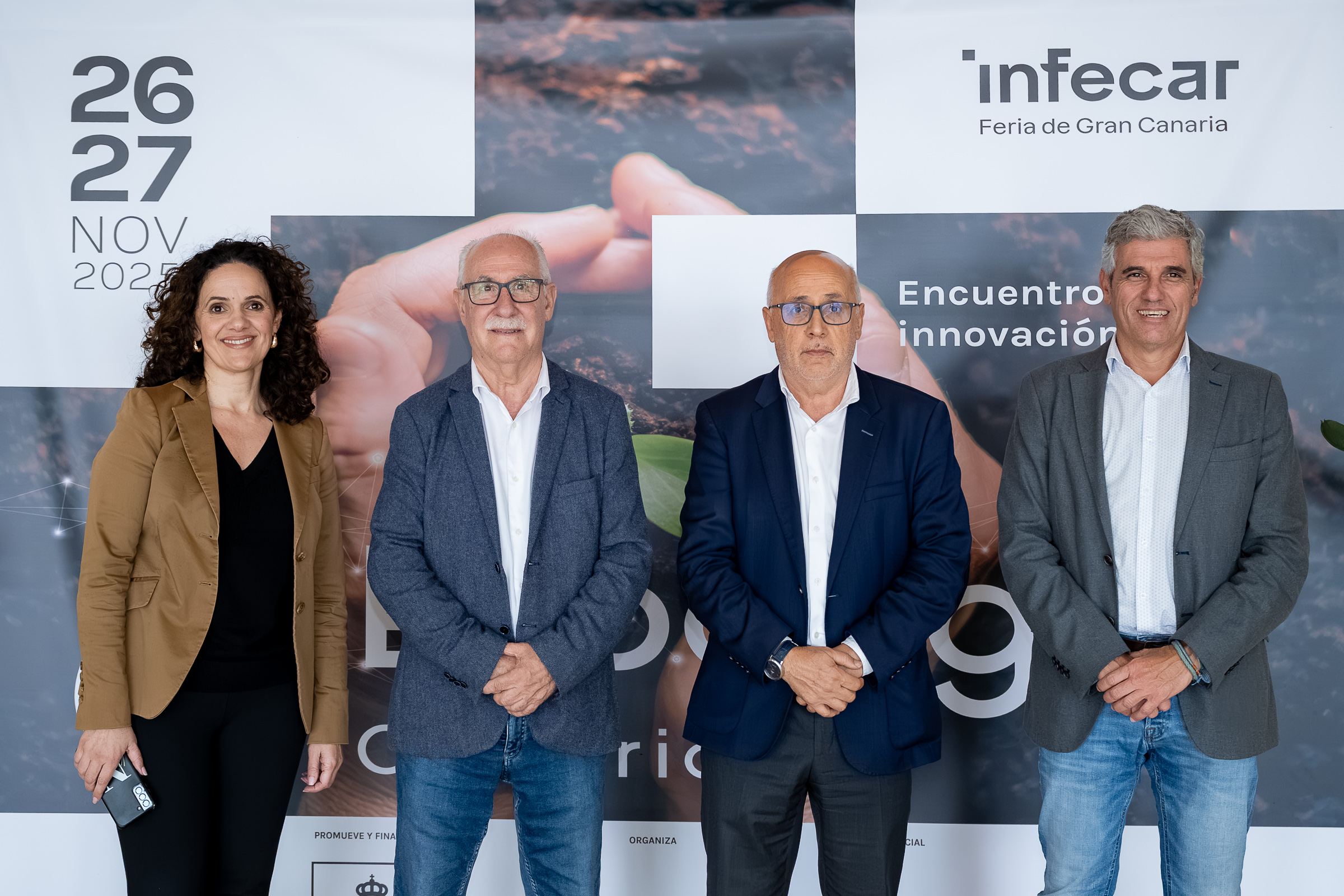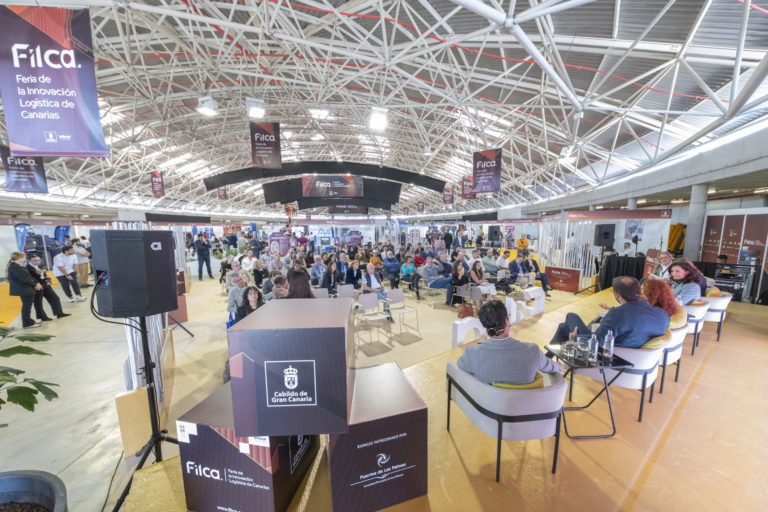- The first session of the Innovation Forum on Urban Arboriculture Management took place this morning, highlighting the importance of planning green spaces in cities
The President of the Cabildo of Gran Canaria, Antonio Morales, inaugurated today the fourth edition of the ExpoAgro Canarias Forum, “a space for training, specialisation, debate and analysis around the major challenges facing the primary sector.” The president recalled that “the primary sector is a strategic area for the island’s government” and that, as such, “we continue working towards achieving the highest levels of food sovereignty.”
In this sense, these Innovation Meetings linked to the primary sector offer expert insights into new approaches and techniques that will “improve the competitiveness of the sector which, the more technified it becomes, the more sustainable it will be, and which dignify the work of the men and women who work every day in the rural world.”
Carlos Álvarez, researcher at the Canary Islands Institute of Agrarian Research (ICIA), addressed the optimisation of irrigation in banana and avocado crops, and how the use of technology can save water in these cultivation systems on islands where “there is less and less water and more heat.” Osvaldo Renz, head of the Tenerife Irrigation Office, also spoke about irrigation efficiency, highlighting the importance of diagnosing in order to advise on efficient irrigation, because “it is very difficult to recommend irrigation practices without knowing how someone’s irrigation system actually works.”
“There are still quite a few leaks in the systems, more leaks than farmers are aware of,” Renz explained, adding that more awareness is needed in the sector to avoid over-irrigation, “because farmers believe things must be done in a certain way.” According to these researchers, however, “water is not being distributed properly” in plots where avocados and bananas are grown, Álvarez added.
In the same vein, Pedro Gavilán, researcher at the Institute of Agricultural and Fisheries Research and Training (IFAPA) of the Regional Government of Andalusia, presented as a practical case how irrigation sustainability has been achieved in red berry crops in the province of Huelva—an area that produces 98% of Spain’s total production—using digital tools. However, he pointed out that “digital transformation still needs to advance, not only in irrigation but in reducing monitoring costs, avoiding data loss, etc.”
Javier Hernández, technician at the Institute of Renewable Energies (ITER), expanded on this issue and presented a tool based on AI currently being developed by ITER. It collects data more accurately and, when combined with meteorological information and crop status, is capable of building historical records and predicting irrigation needs more efficiently.
Foro de Arboricultura
In the morning, the Councillor for Primary Sector, Food Sovereignty and Water Security of the Cabildo de Gran Canaria, Miguel Hidalgo, welcomed attendees to the first session of the Innovation Forum on Urban Arboriculture Management, held within the framework of ExpoAgro Canarias. He highlighted that these two days will serve as “a meeting point to promote collaboration and working networks to adopt more sustainable and efficient practices in the management of urban resources.”
During the opening of this first edition of the forum, the councillor emphasised “the importance of creating spaces with large trees in urban layouts and in future municipal planning, creating natural shaded areas that can reduce temperatures and improve the quality of life of citizens living in our cities.”
In the same line, agricultural engineers M.ª Ángeles Asensio and Javier Amat underlined the need to “apply common sense to the management of urban trees and green infrastructure,” stressing its direct impact on health and wellbeing. Asensio explained that trees act as “true bioclimatic refuges, capable of reducing temperatures naturally by 2 to 8 degrees, unlike artificial shelters that require high energy consumption,” and recalled, among many other benefits, that urban trees absorb pollution particles, improve air quality, mitigate runoff, promote physical activity, reduce obesity and cardiovascular problems, offer mental health benefits, and foster social interaction—especially in sensitive environments such as schools and hospitals.
For his part, Javier Amat insisted that “we must begin to make cities more liveable,” advocating for compliance with the 3-30-300 rule: seeing three trees from home, achieving 30% tree canopy cover in each neighbourhood, and living no more than 300 metres from a green space of at least half a hectare.
Both speakers agreed that trees are “the champions of efficiency” and that it is urgent to rethink public investment to place nature at the centre, protect living soil, reuse pruning as a resource and build a high-quality urban green infrastructure that responds to the needs of an increasingly urban population.
In his presentation on fungi and roots in the Canary Islands’ urban environment, arboriculture technician Pablo J. Pérez explained the essential role that soil fungi play and their close interaction with trees. He distinguished between different types of fungi that generally benefit trees: “trees and fungi need each other to increase resistance, better tolerate adverse urban conditions and extend their longevity,” making this relationship key to more effective and sustainable urban tree management.
To conclude the day’s programme, Ana Pérez, urban green infrastructure technician at the City Council of Huesca, and Lorena Escuer, biologist specialised in Integrated Pest Management (IPM) and biological control, presented the work carried out in the city of Huesca in recent years, showing “how allowing nature into the city in a controlled and managed way fosters urban biodiversity.”
This first day of the forum ended with a technical visit to the Tony Gallardo Park in Maspalomas, guided by Javier Auré, Technical Director of the Maspalomas Consortium, to show how nature-based solutions have been integrated into an urban environment to regenerate a degraded public space.
ExpoAgro Canarias is an event promoted and funded by the Cabildo de Gran Canaria through its Department of Primary Sector, Food Sovereignty and Water Security, and organised by Infecar, Feria de Gran Canaria, with Cajasiete as official collaborator.



